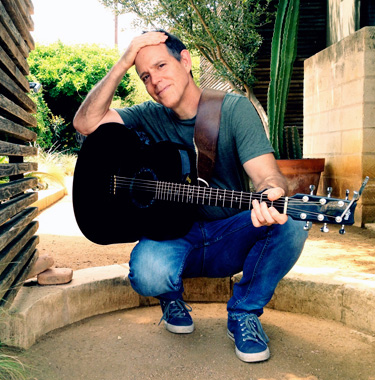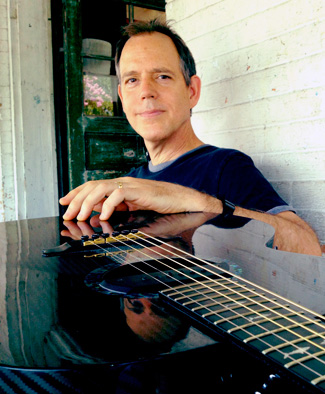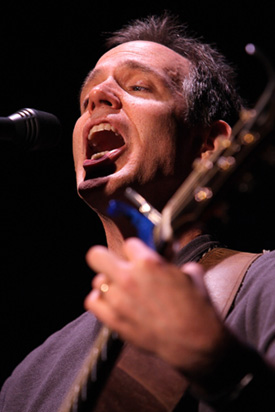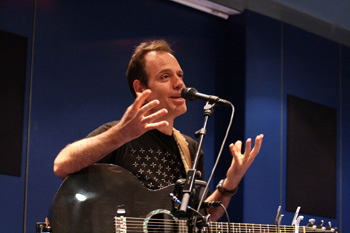DON’T MISS: Our upcoming review and exclusive Interview with Shawn Colvin, who’s appearing in two sold out shows at MIM January 22nd and 23rd
“The people who are still making money on record deals are the people who are signed to Disney because they're marketing to 12 year olds. And that's great as long as you're 12 and your goal is to be like everybody else." David Wilcox
An Interview with David Wilcox
David Wilcox Returns to MIM Jan 25th
By Mariah Fleming

David Wilcox is returning to the Musical Instrument Museum for a solo show Saturday, January 25 at 7:30 p.m. Tickets are going fast but good seats are still available at TheMIM.org. Having seen Wilcox in concert, I have no doubt that his concert will be an entertaining and enlightening affair. Over nearly three decades, Wilcox has earned exceptionally devoted fans. Admired by his peers as well as his fans, Wilcox is regarded as a "songwriter's songwriter." He’s got 17 albums under his belt, and his new one, “Blaze” will be released later this year. His songs are lyrically wondrous, his guitar work is exceptional, and his attitude about life is seasoned with a strong sprinkling of wit. I talked to David from his home in North Carolina last week. He said he enjoyed it, and so did I. I hope you will too.
Q.Do you have a particular writing process or did it evolve over the years?
A. I've gotten better at what I do; in order to write songs that move me and make me feel more alive it requires me to put myself in this vulnerable place where I don't feel good, I don't feel complete and I don't feel at peace. And I kind of go in there armed with nothing but music. (laughs)
Q.When you write about a sad topic, is it a challenge to do it and still interest the listener? I think of Nick Drake for example. I adore Nick Drake, but sometimes I have to take Nick Drake in small doses. (laughs heartily)
A. Years ago I said, in terms of a lifetime goal, "I want to go as deep as Nick Drake but to live." The goal is not to stop with the first emotion but to tell the whole story. There are some songs that start and finish with the same certainty. And that is an accurate way of describing what the singer feels. But it's not as good at leading the listener into that same emotion.
Q.One of my favorite songs is "Jamie's Secret" on "How Did You Find Me Here" about your friend who died. It's written to the tune of a traditional English folk song, "Lord Franklin" which I know from Pentangle. How did you happen to put your lyrics to that melody?
A. I heard that song on a single fiddler's record a long time ago. That song is the story of an adventurer, of a person driven to find a passageway, who doesn't quite make it through, but had the passion to, for the sake of all of us, complete it. That was my friend Jamie. A song like that can record the emotions of a time better than a photograph.
Q.I ran across a quote of yours that made me laugh out loud. You said, "I was raised by devout curmudgeons. There was a lot of depression in my family." Your dad was a psychologist, and you grew up being told it might be genetic. Did that frighten you or were you more challenged?
A.(guffaws) That was where I sharpened my resolve! I realized that I have a tool that he didn't have. I have this ability to practice going to the place in my heart where I am so devastated by seeing the inevitable outcome of the way I am behaving, that I can actually shake myself out of that dogmatic slumber and do something about it! And it's hard to fix mind with mind because it's your thinking that fools you and you're trying to fix it with thinking. When I write, I am able to hear a song and sort of craft it bit by bit. So I can have a song that in the midst of my confusion is way smarter than me.

Q. I don't know if your dad is still living but how does your dad or did you dad react to your music?
A. He is still living and when I play him a new song, sometimes he will kind of have a combination of "I wish you hadn't said that…but that's really true" kind of a feeling of, um…
Q.Like you're airing our dirty laundry, son?
A. Yeah. And the wild part is, my father was making his living helping people deal with emotions, yet there was a certain fear of emotions, which was probably just generational. But he was also ahead of his time for his time. There was a lot of fear of emotion and there was also actual taboo. Like 'guys are not supposed to feel this, they're supposed to be stoic and just press on regardless.'
Q.Were you afraid to express emotions when you were growing up?
A. I had a very different assumption about emotions. I figured if you're lost in the woods you need navigation to find a way back to civilization. You need to not die out there. Part of the difference between a life that arrives at joy and bliss and community and a good story, and a life that sort of runs up on the rocks and just dies there, is someone who knows their own heart or someone who ignores their own heart. So, it's been a fascinating journey and it feels like so much of the promise that music held out, just in the way it made me feel, has really come true.
Q.Has growing up knowing that depression can be debilitating and lead to all kinds of addictions informed the way you approach your career?
A. Yeah.
Q.I don't mean to get too personal but it sounds to me like you didn't have to endure the kinds of addictions that sometimes seem ubiquitous in the music world.
A.Yes that's true. And that's because I knew from the time I was probably 12 that I had that tendency. I knew that it was a slippery slope and that I couldn't offer myself any instant comfort.
Q.So, how do you define depression?
A.Well, imagine the mind as sort of like this big factory always going 'chug, chug, chug' where people are getting everything done, and meanwhile there's the restlessness of the emotions, which is mostly kept silent. And the management doesn't want to hear the emotions complaining. But what occasionally happens is that there is so much unrest, that it pretty much shuts down operations.
Q.So is depression sometimes an inspiration?
A. My opinion of depression is if you don't listen to your own heart long enough, eventually your heart will say ok, that's it; we're shutting the place down. And then you're left with 'nothing works' and we're not able to get out of bed and not able to piece together any sort of reason to be. Depression can be a huge wake up. If I frame if that way then depression is my friend. Sometimes it shows up as the last thing that we can't control. So I think it's a soulful rising of discontent.
Q.It seems like a lot of your songs dealt with that sort of thinking.
A.Yeah, if you listen to so many of my old songs, I would just claw away at the wall and little by little until my heart opened. And music became not just a promise, or a method, but an inevitability to feel as open as a good song.
Q.Do you think its easier or harder today to get to get your music heard?
A.Easier. But you have to define your terms. 'Get you music heard' can mean have motivation to tell your story out of respect for the listener who will miraculously find you, and if that's your definition then yes, it's easier. But getting your music heard can also mean, if you're an industry person, that everybody knows you. And that's harder than ever. There isn't the musical royalty anymore that can knight someone and bestow on them this magical power to suddenly be heard by everyone. The people who are still making money on record deals are the people who are signed to Disney because they're marketing to 12 year olds. And that's great as long as you're 12 and your goal is to be like everybody else. Every once in awhile you run across a musician who not only plays you a good song but who plays you a song that makes you realize hey, I can just be myself. And that kind of empowerment is bigger than the safety of the herd.
Q. If you could change anything about becoming a professional musician, what would it be?
A. When I first was dreaming about being a musician I thought, "We need the Robin Hood Factor." Equalization. We need to have the star making machinery suddenly become irrelevant. That would keep people who want to go into the business to make money, out of the business. They wouldn't do it. They would think 'there's no way I'm going to be a big star so what's the point.' And that's good for music.
Q.So much music has become a slick, well-produced commodity. Celebrity baptizes these artists with a kind of infallibility that's just weird, you know?
A.Well it's true no one ever went broke underestimating the artistic standards of the American public! (laughs) The fact that what we see on big media is more kind of surface and lowest common denominator is a symptom of the fact that big media itself less popular. It's on its way out. The notion that someone can tell the American people what to see or listen to, that idea is gone!
Q.Over about 30 years you've built a base of people who are devoted to your music. How did your relationship with the audience develop?
A.When people ask me 'what's your target market' or 'what kind of people are you after" I always just kind of recoil in horror. It's creepy (laughs) I have no idea and it's almost like it's not my business! My relationship with the audience was something that developed without a plan. My plan was just, song by song, to get sane, and to not be suckered into depression and sleeping through my life. Just to wake myself up with music. It's almost as if there is no relationship with the audience, there's only the relationship with your trust that the song will find the right person at the right time.
Q. Do you often have people tell you they've been moved, or affected in some way by your music?
A.Yeah. And when I meet people who have heard a song and been moved by it it's kind of this weird, awkward thing. If you were to ask me what's the finest moment in terms of your brush with fame, it's got to be this story: I was driving to a gig in a southern part of the country where it was hot. The windows were down and I see this couple eating at a small table outside of the restaurant. The husband notices me. He mentions it to his wife and she turns around. And I see him tap his heart and say 'thank you'. I can't hear it but I can see it. And they don't get up, and there's nothing to sign. And that felt tremendously good. And the weird part is, that was about as close as I can handle. So the relationship with the fans is a weird concept to me.

Q. Are there particular things that fans have told you about what your music means to them that have stayed with you?
A.If somebody comes up and says to me oh, my God, you saved my life, I mean, this has actually happened. Like I’m walking down the street and this guy comes up and says, "There's a song of yours that saved my life. I would have been dead. I had the pistol in my hand and this song came on the radio and I put the pistol down." So, I thank him and we hug and I walk away with my wife. And she said, "Why did you blow him off?" And I said, "What? I said thank you!" and she said, "Yeah but he just told you that your music saved his life and you just said thank you?!" So I said, 'What was I supposed to do?' and she said, 'Why not take it in?" And I said, "Take it in? That was HUGE! Where would I put it? It's got nothing to do with me!"
Q.Ok, let's turn it around. When you meet someone who has changed your life and you want to thank him or her, is that uncomfortable for you?
A. Every time I've gone back to try and thank the people who have changed my life by saying the right thing at the right time, I always make them uncomfortable and they never know what to do with it and they think I'm weird and creepy. I'm hopeless. Now I have this rule: "Never talk about the past with someone who you know from their work" because it's like the worst thing.
Q.That's an interesting way to look at it. In a different direction, about your recording process, when you work with other people do you record live all at once or do people send you digital tracks?
A.It's happens different ways, it sort of alternates, Like with this new record "Blaze" that's coming out this year, the process tends to be inspired by the mood of the songs or the general challenge about what would most bring out the heart of the song. There are a lot of records that are recorded with an initial sort of rhythm section, or my tracks get done and I add stuff little by little. And that has a practicality about it. But there's something really fun about bringing your game for the moment when it counts, and recording a song with everybody. And it's gotta be good, this is it! And it's an interesting thing because technically it's never as good.
Q. Why do you say that?
A.Each performance can't be as good when you have to record them all at once. But then, what do you mean by 'good"? Maybe good is listening to each other. So there is something more alive and honest in that kind of recording. And I tend to keep coming back to that.
Q.How long does it typically take for you to record a new album?
A.Well, this last project was a great example of making a record fast. We'd do each tune together once and not practice and practice but just get it fresh, get it wild and then come back the next day and do it again and it was great!
Q.Where did you record it?
A.In Cincinnati, my friend Rich has this wonderful studio called The Monastery. We had a great rhythm section; we got a lot of fresh ideas.
Q.It sounds like it's going to be an interesting album, kind of different?
A.Exactly, it is very different. There are some songs on that record where the music just had more emotional range because of the instrumentation and the intensity of the riffs. And it just called for lyrics that are different from what I had written before.
Q.So the instrumentation challenged you to write lyrics that reflected the intensity of the instrumentation?
A.Yeah. And I thought, well, if that’s the sound track to the scene, then what's the scene? Where have I felt like that? And what I came to was hiking out in the northwest and seeing all the forests that are dying, and realizing that when humans really need to feel their lives in context, they have always gone to nature. But now we have hurt the forest. And that is a bizarre contradiction. And so ah, man, "Guilty by Degree' is the song. And it's got a guitar riff that still scares me. But I thought if this lyric is behind it, I can absolutely stand up and sing in front of this guitar riff and not feel like it's wagging the dog
Q.In the context of what's happening in the 21st century, as an artist you observe even more acutely because you write. In this society thus far what do you see think is the most hopeful thing and what is the most troubling?
A.Well, the fact that we are connecting as individuals through technology, I think that that opens up possibilities. Humans are gradually realizing they can have that kind of openness and vulnerability. And as we find it so much easier to kind of find our tribe, we'll find safety in that. So far it hasn't been something that most people find as safe, just because most people are still treating it as if they're yelling at the world when they rant on the web and cut other people down. They're still feeling really small like they have to be violent and fight this giant machine. I think eventually people will start to realize they're just talking to other individuals and they don' have to yell. And we will find our tribes more easily. And the people who are most quirky will thrive. It will be easier for them to find a place to fit. As for the scary thing about life in this century, well, I love to believe that with enough time humans will outgrow their old ideas. I’m just hoping we have enough time. I think that the scary part is if we almost had it and we just ran out of time.
Q. Have you written about that specifically?
A.I don't think I've written about that. There are so many songs to write!
Q.Let's talk about your family for a while. How many days a year are you on the road and how do you balance that with your family life?
A.I do like ten days a month and the rest is home. So it's kind of one of those things that if you look at it one way, I kind of sabotaged my music career because I didn't know what you're supposed to do.
Q.How has that sabotaged your music career?
A.Well, not for me, because what I wanted was to be home and to have a life worth singing about. I didn't want songs about that sort of rarified air of the life of the celebrity, I don't relate to that. So I just wanted songs about dealing with real life, with the constraints of sort of normal finances and all that. So usually that just means playing weekends.
Q.How old is your son now, and is he at all musical?
A.He is! Nathan's got a lot more talent than me! But also he's way smarter than me! He probably will have a lot of music in his life, but not do it for work (laughs) and at 21, he's got many choices.
Q.You were on A&M for quite awhile and you moved to independent labels. Are you required to write a contract with the label that you're going to do an album and do a certain number of dates on the road to support it, or that kind of thing?
A.No, I have never had that kind of oversight. No one's ever exerted any control about a record or how much I toured or anything. Even with A&M. In fact I started out on a sub label of A&M called "Americana" and they just wanted to put out some great music. They never looked at me like I was going to be their moneymaker. They could use it as a tax write off. Music was big business in those days.

Q.You've played at the MIM before. Did you see the exhibits?
A.I didn't have enough time before to see all the exhibits, especially those national exhibits upstairs. They're wonderful. And I so love the story of the guy who ran Target who was talking to a friend about how he was trying to buy a painting for a gazillion dollars and his friend said "For a painting? You could start a museum!" And the guy said, "Yeah, I think I will!"
Q.It's an amazing place, one of a kind, isn’t it?
A.Yeah it really is!
Q.How do you like the concert theater?
A.It’s absolutely the best. That's what happens when you have a gazillion dollars, you can say to somebody 'make me a concert theatre and make it the best!' (laughs)
Q.Do you like to talk to your fans after the show and are you going to come out after your concert?
A.I do come out and try to be as goofy and nerdy, well, I’m just geekin' about all that stuff. So, yes, I will come out after the show and listen and talk.
Q.Well, David, I thoroughly enjoy listening to your music and I’m happy that you took the time to talk with me this much.
A.My pleasure. I'm grateful that you think of interesting things to ask. It was really fun for me and I felt like there was receptivity on your end, so thank you for that.
January 14, 2014
Contact the author of this article at Editor@MusicAndMoreAZ.com.